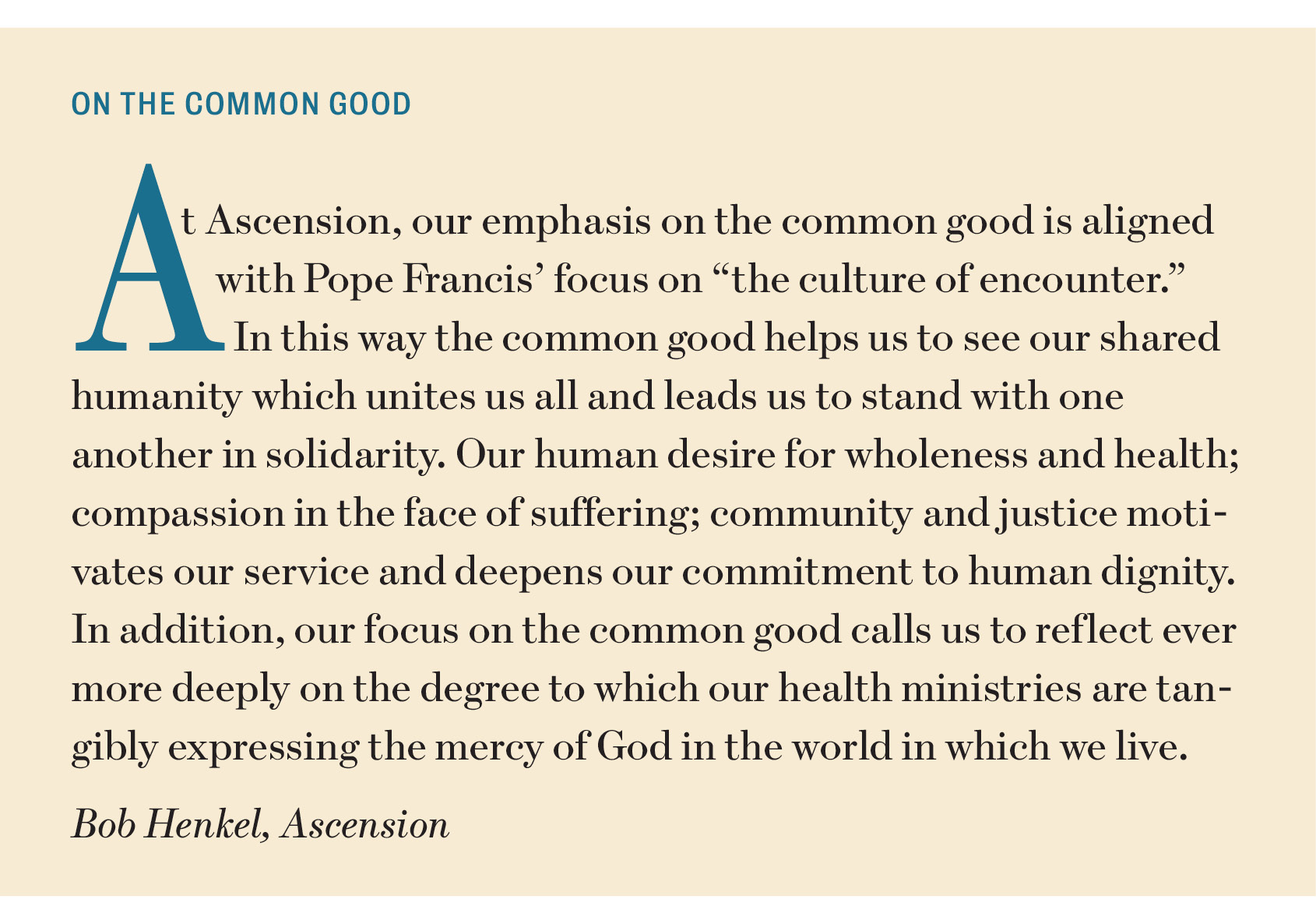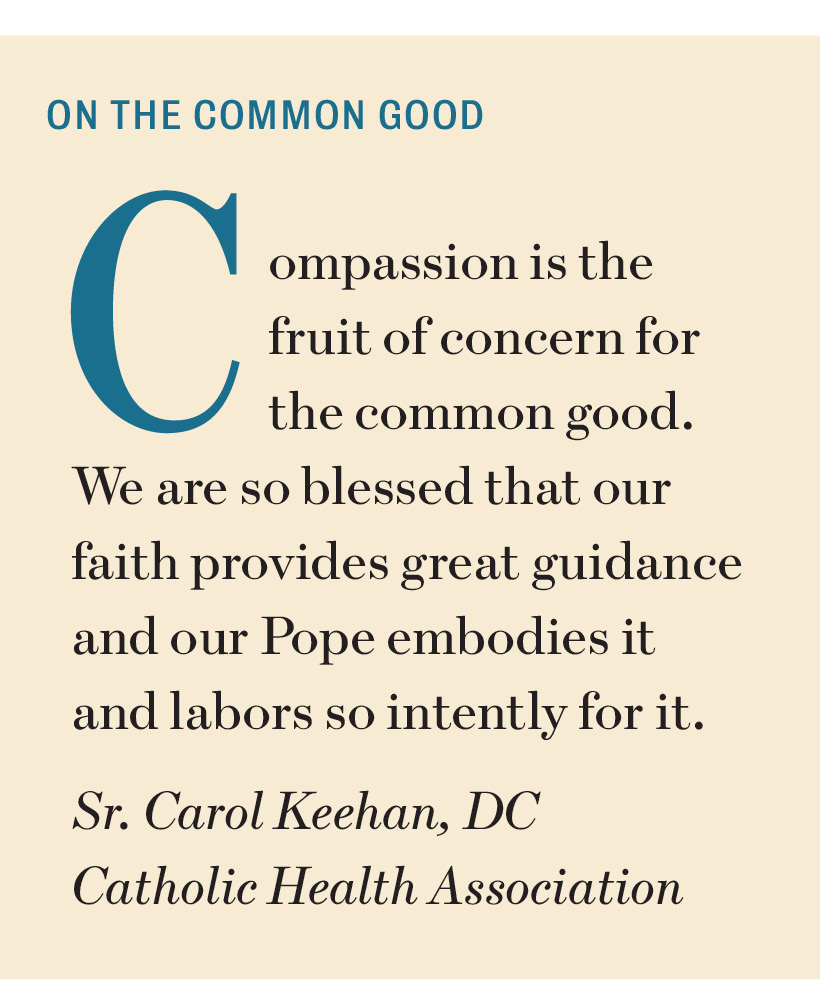BY: MICHAEL J. NAUGHTON, MA, PhD

The common good is one of those terms that most of us think we understand until we start talking about it. Our conversations too often become platitudinous and moralistic, feeling more and more abstract and vague. As one health care executive said to me, "How would I know if the common good bit me?"
Although the common good is not an easy principle to speak about, we are in desperate need of it today. Our individualistic and consumeristic culture too often describes the choices of consumers and patients as discrete acts that have no good shared in common, leaving people autonomous but isolated.
COMMON GOOD DEFINED
Within Catholic social teachings, the standard description of the common good is "the sum total of social conditions which allow people, either as groups or as individuals, to reach their fulfillment more fully and more easily."1
The conditions of social life that allow people to attain their own fulfillment — what the Catholic tradition calls integral human development — are akin to a garden in which the soil is nurtured through watering, tilling and fertilizing, all of which increase the seed's chances for growth. But it is the seed that must grow.
In a similar way, institutions such as business, family, school, health care or the state should set up the conditions under which people grow, but it is the person who must make the choice to develop in relation to others. These two elements — the conditions for human fulfilment and the personal choice to engage in that development — are key to the common good.
SOCIAL CONDITIONS
In reference to business, there are two levels on which to think of social conditions in relation to the common good. On a more general level, it takes many institutions in good relationship with each other to foster the common good. One of the things we need to be clear about is that no one institution, including the state or business or health care, can embody the fullness of the common good. We need a host of institutions, especially the family and religion, but also business, charities, education and health care, as well as the state.
Clearly, if a society does not have vibrant institutions, the conditions for social living suffer. Without a dynamic entrepreneurial economy, societies stagnate. When the family structure comes apart, serious social and economic problems plague a community.

In other words, the common good is made up of a network of institutions from diverse sectors and levels, each producing good. These institutions are not restricted only to the state, nor do they derive their legitimacy from the state. As a limited entity itself, the state must respect the other institutions' gifts and provide the support required to guarantee orderly and free functioning across the various sectors.
On a more specific level, one way to understand social conditions as related to specific institutions is to articulate the good each institution generates for the wider society. As it relates to business, the document Vocation of the Business Leader produced by the Vatican's Pontifical Council for Justice and Peace speaks about three positive ways business contributes to the social conditions of society: 2
- Making goods and services that truly are good and that serve
- Organizing work in which employees develop their gifts and talents so as to serve the world
- Creating sustainable wealth so that it can be distributed justly
When all three are present, business contributes positively to the social conditions that increase the probability people will develop and flourish in their connection to business.
INTEGRAL HUMAN DEVELOPMENT
Although the three good conditions are critically important, they are not the actual fulfillment of integral human development. We have to remember that the heart of the common good is not things, nor wealth, nor policies, nor structures, but the quality of relationships (the goods held in common) among people that brings forth the integral development of each. The common good, then, can be more precisely defined as "the good of all people and of the whole person."3
The common good reveals the paradoxical reality often lost in an individualistic and consumeristic culture that fixates only on the choice and autonomy of the consumer or patient. The insight is this: I cannot achieve my "good" except by ordering it toward your "good" in such a way that we develop community in which each develops in an integral way. We cannot underestimate the social and communal nature of the person.
This is why virtues are so important. In order for these social conditions or "goods" to develop the whole person, that is, to develop integrally, we must order these goods toward the good of others.
Thomas Aquinas made this point more than 700 years ago: "A man's will is not right in willing a particular good, unless he refer it to the common good as an end."4 The common good is the principle that describes how we share goods in common that build up communities of persons for fostering the development of each.
This sharing entails two ways in which we share goods in common. One way is that we share things that lead to diminishment. For example, when an organization must allocate resources, there is a limited amount, and when the resources are distributed, one group will get more and another less. This is why the virtue of justice is so important as it relates to the distribution of goods. When, for example, a business fails to pay a living wage or when it disproportionately distributes incentives and rewards to executives, the lack of justice prevents a community of persons to develop.
The second kind of sharing is a participation of goods without diminishment. When a candle lights another candle, it does so without diminishment to itself, and it creates more light. A good that is shared without diminishment gets us closer to a fuller understanding of the common good, as well as to its difficulty.
William O'Brien, former CEO of Hanover Insurance Group in Worcester, Massachusetts, explained that even in workplaces where good products are produced, people are treated well by enlightened human resource practices and wealth is created and distributed, people still can be disenchanted because their work lacks meaning — it does not represent goods shared in common without diminishment.5 Companies can have all the social conditions in place, but still lack community and, ultimately, integral human development.
Why is it, for example, that so many employees become disengaged from their work, including those in health care? There are many reasons for disengaged employees, but when employees fail to share goods that do not diminish — namely, the deeper purpose of the institution — they become isolated from others. A business leader, for example, can work toward balancing all the interests of its stakeholders and bring greater equality in exchanges, but still fail to build community and consequently not develop as a leader.
Shareholders, employees and customers can have all the rights in the world and still be wrong, especially when their particular interests are ordered only to their own particular gain. The stakeholders of a business, if they are to flourish morally and spiritually, must find ways to share goods that do not diminish when shared.
IMPLICATIONS FOR CATHOLIC HEALTH CARE
Because Catholic health care is a collaboration in the healing ministry of Jesus, those within it, and especially its leaders, must understand that the good it produces (namely, social conditions) have deep moral and spiritual roots that need to be shared in common. This is not easy in a pluralistic society, but the identity and mission of Catholic health care depends upon the sharing of such good.
Let me describe these three institutional "goods" in light of rich moral and spiritual principles within the Catholic health care tradition:
1. Catholic health care delivers services guided by the principle of holistic care, which calls for health services to be provided in a way that recognizes patients are not merely bodies, but persons made in God's image. Patients are multifaceted beings who have a physical, social, psychological and spiritual dimension to their existence. Holistic care calls for all those dimensions to be attended to in the healing process, which is to have at its core a profound respect for life from the womb to the tomb. Also, because the Gospel claims that the poor and the vulnerable have a most urgent claim upon our attention, conscience and resources, Catholic health care institutions must seek ways to attend to the health care needs of people who are poor and vulnerable. Catholic health care is called to be in solidarity with the poor in their plight, to listen to them and to advocate on their behalf.
2. Within Catholic health care, all work has dignity, whether it is performed by a chief executive officer, a physician, a nurse, an aide or a janitor. Because work changes the person doing the work, leaders must create conditions that foster the development of co-workers. In Catholic health care, subsidiarity asks leaders to consider what their organizations and employees might be if their full gifts were realized.
Subsidiarity posits that leaders are at their best when they build organizations that actively draw upon the diverse gifts, talents, abilities and skills of all co-workers. Indeed, subsidiarity affirms that as workers, we not only are bearers of rights, but are bearers of gifts, and that our vocation is exercised when we exercise such gifts.
Subsidiarity also posits that leaders are at their worst when they steal employees' initiative, creativity and gifts by being unnecessarily controlling and micromanaging.
3. Catholic health care leaders are called to be like the good stewards in the Gospel parable of the talents, that is, by producing more than what has been given to them. They are called to do this with respect to the various types of resources entrusted to their organization: the skills, knowledge and abilities of employees; financial assets; and facilities, property and equipment.
Relevant to this principle are such topics as revenue growth, market share, margins, service quality, operational effectiveness, productivity, employee development and environmental impact.
Wealth creation brings with it the concomitant task of wealth distribution. For Catholic health care leaders, the principle of just distribution calls for wealth to be allocated in a way that fosters right relationships. Among other things, the principle of just distribution calls leaders to discern and account for the moral implications of how they set prices, compensate associates, manage payables and receivables, etc. These decisions affect relationships with a number of stakeholders, including patients, payers, associates, suppliers and the communities in which the institution operates. These decisions also impact the very viability of the organization.
These three institutional "goods" create important social conditions for people to develop. Our society needs this kind of health care, which is why Catholic health care is so critical to the common good. Without a deep moral and spiritual root system, health care, especially within an increasingly technocratic culture, will more likely default to being a commodity, where price is the driving force to all decisions.
Achieving all three of these "goods" all the time is an immense challenge. These things are in constant tension with each other. Take for example the increasing standardization and centralization of many systems to capitalize on greater efficiencies, which can unintentionally result in the disenfranchisement of those who work in local ministries.
This is why all leaders, and especially those in Catholic health care, need the virtues to order and manage the tensions for the good of all. The virtues have the capacity to create bonds of connections with others without diminishment. They establish relationships that are real communions and not merely contracts or mutually self-serving exchanges. These relationships generate trust, loyalty, patience and the ability to sacrifice that can move people through tensions and do greater things with each other. Without such virtues as bonds of communion, the ministry fragments and self-interests
dominate.

CONCLUSION
The common good is an institutional principle that orients those within institutions towards a robust set of "goods" that, when shared, lead to people's development. As leaders of Catholic health care institutions, you must ask yourselves what institutional levers you have that increase the probability of your institution to fulfill the common good.
Here are three examples:
1. Mission-Driven Hiring and Recruitment: Do you hire and recruit people who understand and are open to the depths the three "goods" of Catholic health care have to offer and who have the competencies and skill to operationalize them? Or do you hire only on the basis of technical competence?
2. Leadership Formation: Do you provide opportunities for your associates to go deeper into how these "goods" are understood and how they are ordered? This entails space and time to deepen the moral, spiritual and intellectual dimensions of leadership. Or do such opportunities focus only on leadership development?
3. Assessment: Do you assess your Catholic identity and mission? Do you know whether you are really being a Catholic ministry, achieving the deep roots of the three "goods" expressed above? Or do you simply assess that which is easily expressed in quantitative metrics?
In my experience, Catholic health care has done a good job of using these three levers, but the market pressures of margins and efficiencies, the regulatory environment and the larger cultural changes are going to make the work more difficult in the future. That is why understanding the common good at this moment is so important.
MICHAEL J. NAUGHTON is the director of the Center for Catholic Studies at the University of St. Thomas in St. Paul, Minnesota. He holds the Koch Chair in Catholic Studies and is a full professor in the department of Catholic Studies. In partnership with the Pontifical Council for Justice and Peace, he helped coordinate and write the Vocation of the Business Leader, issued in 2012.
NOTES
- Catechism of the Catholic Church, paragraph 1906. http://www.vatican.va/archive/ccc_css/archive/catechism/p3s1c2a2.htm.
- Pontifical Council for Justice and Peace, Vocation of the Business Leader. www.stthomas.edu/cathstudies/cst/research/publications/vocationbusinesslead/.
- Pontifical Council for Justice and Peace, Compendium of the Social Doctrine of the Church, section 165. www.vatican.va/roman_curia/pontifical_councils/justpeace/documents/rc_pc_justpeace_doc_20060526_compendio-dott-soc_en.html.
- Thomas Aquinas, Summa Theologica, Vol. II, Part 2, Question 19, Article 10.
- William J. O'Brien, Character at Work: Building Prosperity through the Practice of Virtue (New York: Paulist Press, 2008) 104.
QUESTIONS FOR DISCUSSIONThe common good is a phrase that seems so simple — a familiar adjective, a common noun — but even philosophers and theologians have a hard time agreeing on what it means. Consider your intuitive sense of the common good. How does that compare with Michael Naughton's description of the three goods: Good goods and services; good work; and good wealth? In the article's conclusion, Naughton describes three ways to help institutions discern and act for the common good. Discuss how does your ministry approaches these practices. • What is your ministry is doing to promote mission-driven hiring and recruitment? • What opportunities does your ministry offer for leadership formation to help every employee reach personal fulfillment and grow in sensitivity to the common good? • How do you assess your ministry's Catholic identity and commitment to the common good in its long-term vision as well as in its daily operations? |
